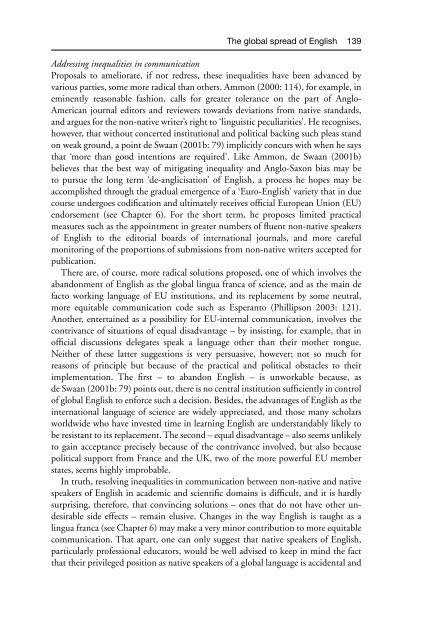Gibson Ferguson Language Planning and Education Edinburgh ...
Gibson Ferguson Language Planning and Education Edinburgh ...
Gibson Ferguson Language Planning and Education Edinburgh ...
You also want an ePaper? Increase the reach of your titles
YUMPU automatically turns print PDFs into web optimized ePapers that Google loves.
The global spread of English 139<br />
Addressing inequalities in communication<br />
Proposals to ameliorate, if not redress, these inequalities have been advanced by<br />
various parties, some more radical than others. Ammon (2000: 114), for example, in<br />
eminently reasonable fashion, calls for greater tolerance on the part of Anglo-<br />
American journal editors <strong>and</strong> reviewers towards deviations from native st<strong>and</strong>ards,<br />
<strong>and</strong> argues for the non-native writer’s right to ‘linguistic peculiarities’. He recognises,<br />
however, that without concerted institutional <strong>and</strong> political backing such pleas st<strong>and</strong><br />
on weak ground, a point de Swaan (2001b: 79) implicitly concurs with when he says<br />
that ‘more than good intentions are required’. Like Ammon, de Swaan (2001b)<br />
believes that the best way of mitigating inequality <strong>and</strong> Anglo-Saxon bias may be<br />
to pursue the long term ‘de-anglicisation’ of English, a process he hopes may be<br />
accomplished through the gradual emergence of a ‘Euro-English’ variety that in due<br />
course undergoes codification <strong>and</strong> ultimately receives official European Union (EU)<br />
endorsement (see Chapter 6). For the short term, he proposes limited practical<br />
measures such as the appointment in greater numbers of fluent non-native speakers<br />
of English to the editorial boards of international journals, <strong>and</strong> more careful<br />
monitoring of the proportions of submissions from non-native writers accepted for<br />
publication.<br />
There are, of course, more radical solutions proposed, one of which involves the<br />
ab<strong>and</strong>onment of English as the global lingua franca of science, <strong>and</strong> as the main de<br />
facto working language of EU institutions, <strong>and</strong> its replacement by some neutral,<br />
more equitable communication code such as Esperanto (Phillipson 2003: 121).<br />
Another, entertained as a possibility for EU-internal communication, involves the<br />
contrivance of situations of equal disadvantage – by insisting, for example, that in<br />
official discussions delegates speak a language other than their mother tongue.<br />
Neither of these latter suggestions is very persuasive, however; not so much for<br />
reasons of principle but because of the practical <strong>and</strong> political obstacles to their<br />
implementation. The first – to ab<strong>and</strong>on English – is unworkable because, as<br />
de Swaan (2001b: 79) points out, there is no central institution sufficiently in control<br />
of global English to enforce such a decision. Besides, the advantages of English as the<br />
international language of science are widely appreciated, <strong>and</strong> those many scholars<br />
worldwide who have invested time in learning English are underst<strong>and</strong>ably likely to<br />
be resistant to its replacement. The second – equal disadvantage – also seems unlikely<br />
to gain acceptance precisely because of the contrivance involved, but also because<br />
political support from France <strong>and</strong> the UK, two of the more powerful EU member<br />
states, seems highly improbable.<br />
In truth, resolving inequalities in communication between non-native <strong>and</strong> native<br />
speakers of English in academic <strong>and</strong> scientific domains is difficult, <strong>and</strong> it is hardly<br />
surprising, therefore, that convincing solutions – ones that do not have other undesirable<br />
side effects – remain elusive. Changes in the way English is taught as a<br />
lingua franca (see Chapter 6) may make a very minor contribution to more equitable<br />
communication. That apart, one can only suggest that native speakers of English,<br />
particularly professional educators, would be well advised to keep in mind the fact<br />
that their privileged position as native speakers of a global language is accidental <strong>and</strong>






